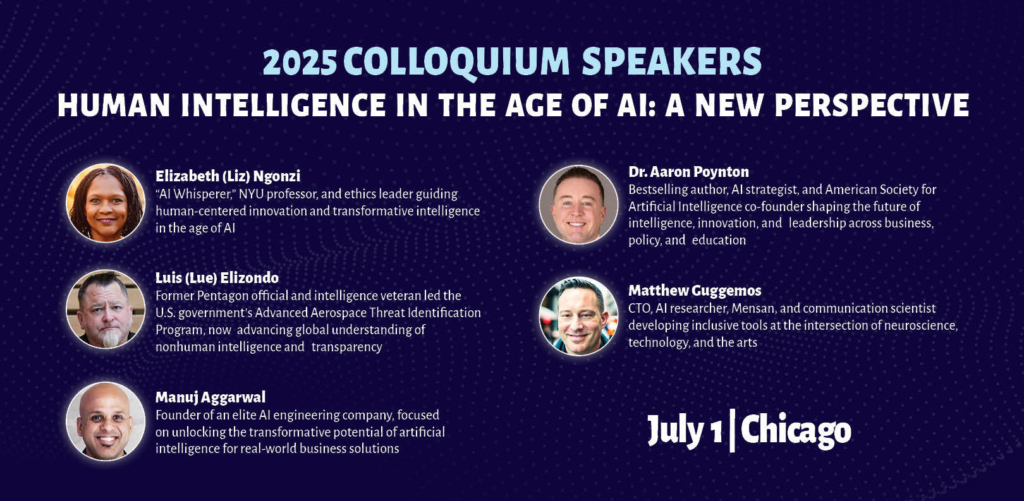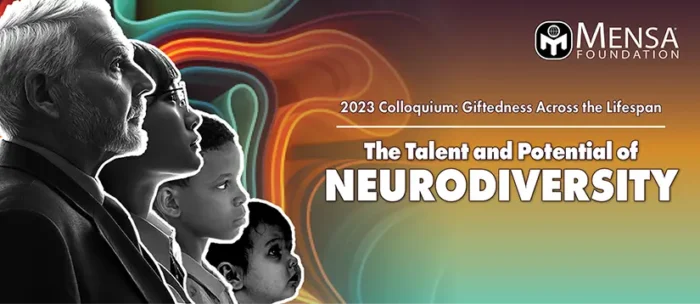Over the past few weeks, I’ve been speaking with each of the presenters for this year’s Mensa Foundation Colloquium. At first, I assumed these conversations would be mostly logistical—refining the flow of the event, confirming presentation titles, and clarifying how the day would unfold.
I did all of that. The schedule is set. The titles are locked in. But the conversations themselves didn’t stay confined to details. They went somewhere else. Somewhere much deeper.
It turns out, when you’re planning an event about Human Intelligence in the Age of AI, things get philosophical pretty quickly. Who would’ve thought? (I say that with just the right amount of sarcasm.)
Anyone with a genuine interest in intelligence—whether emotional, cognitive, creative, artificial, or something else entirely—will likely find these discussions compelling. And if you’re anything like me, you won’t come away with neat conclusions. You’ll leave with more questions than answers.
And maybe that’s exactly the point.
This year’s Colloquium won’t offer a tidy definition of intelligence. It won’t try to wrap the topic in a bow or resolve centuries of debate. Instead, it offers something rarer: space to examine how our understanding of intelligence is evolving and how we might evolve along with it.
Take Liz Ngonzi. Her keynote, AI-Powered: Rewriting the Story of Intelligence, opens the day by inviting us to reconsider the narrative we’ve inherited. Artificial intelligence, she argues, doesn’t replace human intelligence. But it does force us to look again at how we define it. What kinds of intelligence have been ignored? Whose stories have we left out?
Next, Manuj Aggarwal will introduce a framework for using AI to build emotional intelligence. That’s right—build it. This isn’t about AI competing with or dulling our humanity. It’s about how we might use these tools to become more aware, connected, and capable of understanding ourselves and others in a rapidly changing world.
In the afternoon, Dr. Aaron Poynton and Matthew Guggemos will lead a fireside chat that runs the gamut from education to leadership to systems thinking. They’ll explore how AI is reshaping the choices we make, the institutions we rely on, and the ways we learn and lead. But underlying all of that is a deeper question: as systems grow more complex, how do we stay grounded in human agency?
Then, to close the day, Lue Elizondo will ask a question that may be the most disorienting of all: How do we recognize non-human intelligence if all we know how to be is human? His session, To Think, or Not To Think, challenges us to consider that intelligence may not be uniquely ours—and that sentience, awareness, or cognition might take forms we’ve yet to imagine.
These aren’t easy topics. They’re not meant to be. They ask us to stretch—not just conceptually, but emotionally and ethically. They invite us to wonder what intelligence really is when it’s no longer something we can measure, categorize, or control.
After every conversation I’ve had in preparing for this event, I keep coming back to the same thought: maybe intelligence is not even something we have. Maybe it’s something we pass through. A way of relating. A form of movement. A process, not a product. A question, not an answer. Maybe even a state of being.
If what you want is objective truth, this Colloquium might not offer that. But if you’re drawn to curiosity and open to honest reflection, and if you’re willing to reexamine a few of your assumptions—then I hope you’ll join us.
Bring your questions. That’s what we’re making space for.
Register now for the Mensa Foundation Colloquium 2025
Theme: Human Intelligence in the Age of AI
Date: July 1, 2025
Location: Hilton Chicago
You’ll be in good company.











Comments (0)